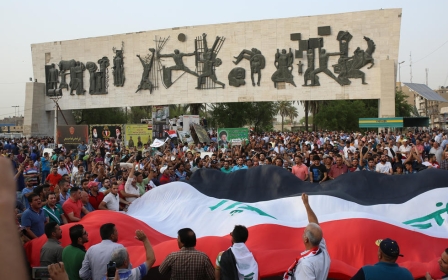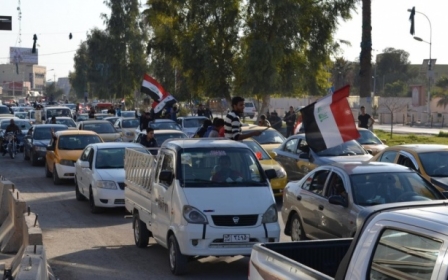Iraq PM calls for sweeping reforms in response to protests
Iraqi Prime Minister Haider al-Abadi called on Sunday for sweeping reforms, including abolishing the post of his rival Nouri al-Maliki, in response to weeks of demonstrations against corruption and poor services.
The proposed reforms, at least some of which require the approval of the cabinet and parliament, followed a call for tough measures by Iraq's top Shiite cleric, Grand Ayatollah Ali al-Sistani.
One of the most drastic of the proposals outlined in an online statement was the call for elimination of the posts of vice president and deputy prime minister "immediately".
Maliki, who preceded Abadi as premier, is currently one of the vice presidents.
Abolishing the post would be a blow to Maliki, but would also set the prime minister on a collision course with his rival, who is from the same Dawa party and still wields significant influence.
On Sunday morning after Abadi's call, Maliki said that he supported the proposal in a post on Facebook.
“I reiterate my position in support of the reforms required by the political process," Maliki wrote.
Lawmakers also said on Saturday they would back the changes, with Salim al-Jabouri, head of Iraq's parliament, saying the body would support the suggested reforms.
However, Abadi's proposed changes would apparently require the constitution to be amended, meaning that rapid action is unlikely.
Many of the mass protests to hit Iraq in recent weeks have complained of prevalent corruption at the highest levels of the Iraqi government.
On Sunday Iraq's attorney general said he intended to open a commission of inquiry into allegations of corruption levelled against Deputy Prime Minister Baha al-Araji, judicial sources told Sky News Arabia.
Abadi also called for a major overhaul of the way officials, including ministers, are selected, saying that all "party and sectarian quotas" should be abolished, and the candidates chosen by a committee appointed by the premier.
He also called for a "comprehensive and immediate reduction" in the number of guards for all officials.
This has long been a problem, with some officials having massive personal protection units, and others hiring less than the allotted number and pocketing the remainder of the allowance.
Baghdad and other cities have seen weeks of protests against the poor quality of services, especially power outages that leave Iraqis with only a few hours of government-supplied electricity per day as temperatures top 50 degrees Celsius.
The demonstrators have blamed the services crisis on corruption and incompetence across the political class.
Sistani, who is revered by millions of Iraqis, called on Friday for Abadi to take "drastic measures" against corruption, saying that the "minor steps" he had announced were not enough.
New MEE newsletter: Jerusalem Dispatch
Sign up to get the latest insights and analysis on Israel-Palestine, alongside Turkey Unpacked and other MEE newsletters
Middle East Eye delivers independent and unrivalled coverage and analysis of the Middle East, North Africa and beyond. To learn more about republishing this content and the associated fees, please fill out this form. More about MEE can be found here.




